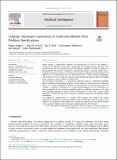CONJURE : automatic generation of constraint models from problem specifications
View/
Date
01/09/2022Author
Grant ID
EP/V027182/1
URF\R\180015
Keywords
Metadata
Show full item recordAbstract
When solving a combinatorial problem, the formulation or model of the problem is critical to the efficiency of the solver. Automating the modelling process has long been of interest because of the expertise and time required to produce an effective model of a given problem. We describe a method to automatically produce constraint models from a problem specification written in the abstract constraint specification language Essence. Our approach is to incrementally refine the specification into a concrete model by applying a chosen refinement rule at each step. Any non-trivial specification may be refined in multiple ways, creating a space of models to choose from. The handling of symmetries is a particularly important aspect of automated modelling. Many combinatorial optimisation problems contain symmetry, which can lead to redundant search. If a partial assignment is shown to be invalid, we are wasting time if we ever consider a symmetric equivalent of it. A particularly important class of symmetries are those introduced by the constraint modelling process: modelling symmetries. We show how modelling symmetries may be broken automatically as they enter a model during refinement, obviating the need for an expensive symmetry detection step following model formulation. Our approach is implemented in a system called Conjure. We compare the models produced by Conjure to constraint models from the literature that are known to be effective. Our empirical results confirm that Conjure can reproduce successfully the kernels of the constraint models of 42 benchmark problems found in the literature.
Citation
Akgun , O , Frisch , A M , Gent , I P , Jefferson , C , Miguel , I J & Nightingale , P 2022 , ' CONJURE : automatic generation of constraint models from problem specifications ' , Artificial Intelligence , vol. 310 , 103751 . https://doi.org/10.1016/j.artint.2022.103751
Publication
Artificial Intelligence
Status
Peer reviewed
ISSN
0004-3702Type
Journal article
Description
Funding: Engineering and Physical Sciences Research Council (EP/V027182/1, EP/P015638/1), Royal Society (URF/R/180015).Collections
Items in the St Andrews Research Repository are protected by copyright, with all rights reserved, unless otherwise indicated.

